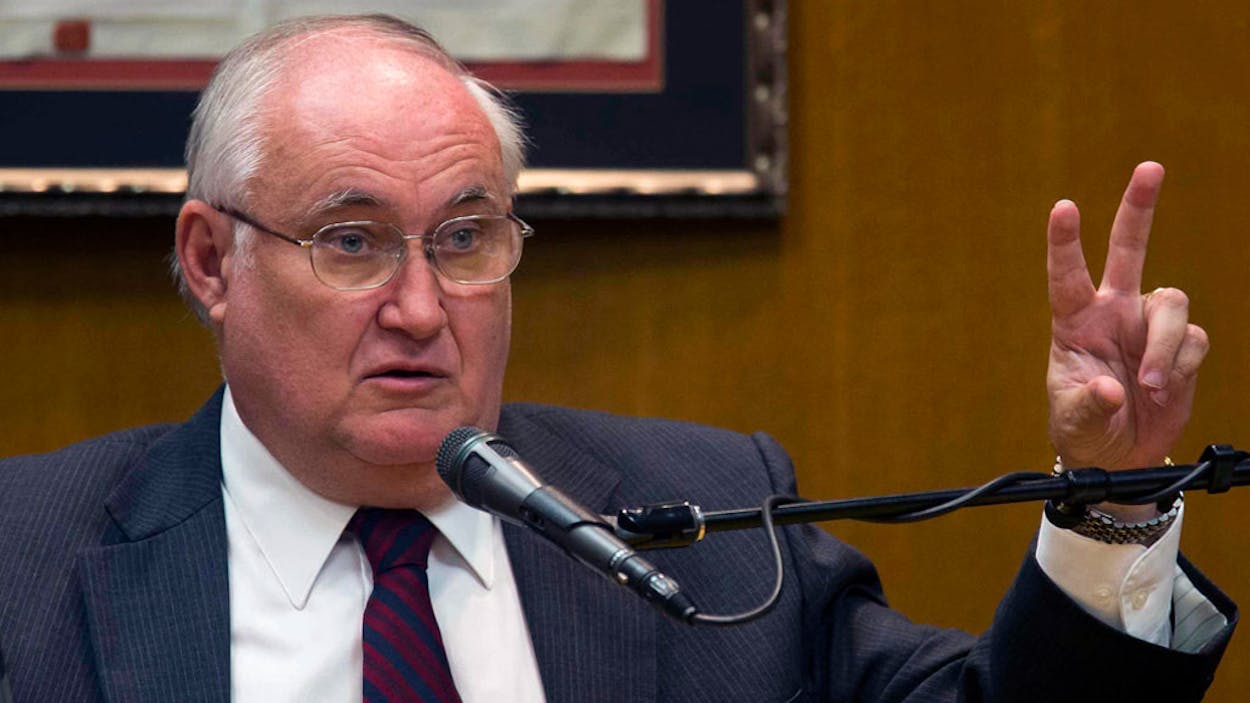If you thought that district judge Ken Anderson’s fall from grace was complete, think again. This week, Anderson—who relentlessly pursued a conviction against Michael Morton in 1987 for the murder of his wife, a crime he did not commit—finally stepped down from the bench and tendered his resignation. Anderson is currently facing the possibility of disbarment and jail time for allegedly failing to share exculpatory evidence with Morton’s defense team in 1987.
This spring, after a court of inquiry examined Anderson’s conduct during the Morton trial, a visiting judge ruled that there was probable cause to believe that Anderson had, in fact, broken the law by withholding critical evidence from Morton’s lawyers. But Anderson—even while facing criminal charges and a civil suit brought by the Texas bar, which is trying to strip him of his law license—remained in office insisting that he had committed no wrong.
When Anderson took the stand during the court of inquiry in February, he struck a sarcastic, defiant tone, discounting the importance of the inquiry itself and casting himself as the victim. He offered only a vague apology to Morton without taking responsibility for his role in Morton’s wrongful conviction, stating that “the system screwed up” and that he could not think of anything he could have done differently. “Anderson seemed more sensitive to his own legacy and how difficult the revelations of the past eighteen months had been on him personally—a subject he returned to many times—than he did to the ordeal of the man he had convicted, who watched him from across the courtroom,” I wrote at the time. “The former prosecutor spoke angrily of spending his life savings to defend himself and of the tremendous toll the accusations against him had taken on his family.” It was a jarring juxtaposition, given that Morton spent nearly 25 years in prison for a crime he did not commit.
So why, suddenly, did Anderson decide to step down this week? Most observers, like Scott Henson at the criminal justice blog Grits for Breakfast, assumed that Anderson—“who seemed to care little about the disgrace he brought to the office and has never admitted the least culpability in Michael Morton’s false conviction”—would “ride this out till the bitter end.” Perhaps, Henson wrote on September 24, “his resignation tells us the man isn’t completely shameless, or perhaps he was just backed into a corner.”
The timing of Anderson’s announcement, just days before the start of the civil trial that was brought by the state bar was set to begin, seemed to indicate the latter. Tactically, it was a smart move. On Wednesday, the day after Anderson tendered his resignation, the start date of his civil trial was postponed to November. Afterward, Claire Mock, spokeswoman for the bar’s Commission for Lawyer Discipline, told the Austin American-Statesman’s Chuck Lindell somewhat cryptically, “The commission continues to work toward a final resolution in this matter that will protect the interests of the public and the bar and is confident that such a resolution will be reached.” So is a plea deal in the works?
No one’s talking right now about what may, or may not, be going on behind the scenes. But on Wednesday, WilcoOnline.com posted a story—which has since disappeared—citing “unconfirmed sources” who said that Anderson has worked out a deal in which he would surrender his law license and spend ten days in jail in exchange for the dismissal of both the criminal and civil cases against him. No word on whether these “unconfirmed sources” are reliable or not.
Whatever happens, it’s an ignoble ending for the man who the Texas bar once named “Prosecutor of the Year.” Anderson, once a well-respected member of the community, had recently set his sights on obtaining an appointment to the Court of Criminal Appeals. Now, even if he somehow avoids standing trial, it may not be the end of his troubles. This week, state Senator Rodney Ellis told Brandi Grissom at the Texas Tribune that he hoped local officials would review additional cases that Anderson had prosecuted in the past to see if there had been other “miscarriages of justice.”







